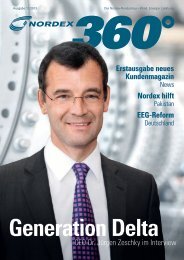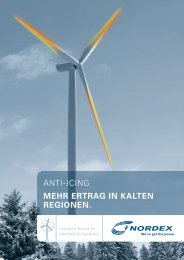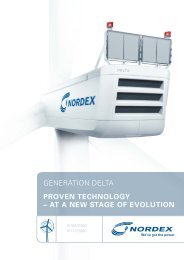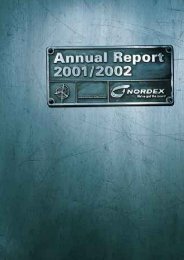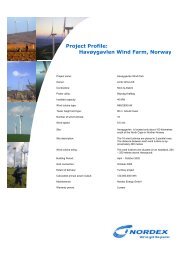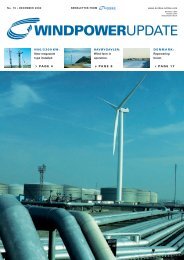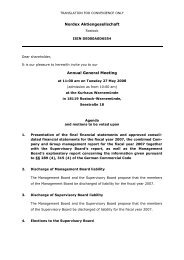OFFERING MEMORANDUM Global Offering of up to ... - Nordex
OFFERING MEMORANDUM Global Offering of up to ... - Nordex
OFFERING MEMORANDUM Global Offering of up to ... - Nordex
You also want an ePaper? Increase the reach of your titles
YUMPU automatically turns print PDFs into web optimized ePapers that Google loves.
Risks Inherent in the Market and Competition<br />
Competition and Market Acceptance<br />
The wind turbine business varies greatly depending on the region, but is highly competitive in certain<br />
markets. The key fac<strong>to</strong>rs defining this competition are the capacity, reliability and quality <strong>of</strong> products,<br />
technological edge over the competition, price, the ability <strong>to</strong> fulfill local market requirements and the<br />
scope and quality <strong>of</strong> maintenance and training services. Some <strong>of</strong> the current or potential competi<strong>to</strong>rs<br />
<strong>of</strong> the <strong>Nordex</strong> Gro<strong>up</strong> have access <strong>to</strong> greater financial, technical, human, marketing, purchasing and<br />
other resources. These competi<strong>to</strong>rs could react more quickly <strong>to</strong> new or emerging technologies or <strong>to</strong><br />
changes in cus<strong>to</strong>mer requirements, or invest more resources in product development and sales, or<br />
deliver competitive products more rapidly or at a lower price than the <strong>Nordex</strong> Gro<strong>up</strong> (see<br />
‘‘Business—Competition’’). In addition, competi<strong>to</strong>rs could form alliances through equity investments or<br />
cooperation deals, thus making their <strong>of</strong>ferings more attractive and intensifying the competition<br />
further. Such competition could lead <strong>to</strong> a decline in prices, reduced sales revenue and pr<strong>of</strong>it margins,<br />
and a decline in the Company’s market share, which could have material adverse effects on the <strong>Nordex</strong><br />
Gro<strong>up</strong> and its business, financial condition and results <strong>of</strong> operations.<br />
The level <strong>of</strong> demand for the Company’s products continues <strong>to</strong> be dependent on among other things,<br />
the development <strong>of</strong> the market for wind turbines, the performance <strong>of</strong> services and the type <strong>of</strong> power<br />
generation used <strong>to</strong> satisfy demand for electricity. A key fac<strong>to</strong>r for the success <strong>of</strong> power generation from<br />
wind energy is the cost at which the electricity can be produced and the scope <strong>of</strong> financial s<strong>up</strong>port for<br />
this type <strong>of</strong> power generation (see ‘‘—Legal Risks—Governmental Regulation’’). There can be no<br />
assurance that such costs can be kept low, or that there will be continued financial s<strong>up</strong>port for this<br />
power generation. Discontinued s<strong>up</strong>port could have material adverse effects on the Company’s<br />
business, financial condition and results <strong>of</strong> operations.<br />
Technological Change<br />
There is a trend in the Company’s markets <strong>to</strong>ward larger and more powerful wind turbines, increased<br />
efficiency and ease <strong>of</strong> maintenance, and the continuing technical development <strong>of</strong> wind turbines. The<br />
further development <strong>of</strong> products featuring new technologies by <strong>Nordex</strong> or its competi<strong>to</strong>rs could cause<br />
the Gro<strong>up</strong>’s existing products <strong>to</strong> be regarded as outdated and unsaleable. The future success <strong>of</strong> the<br />
<strong>Nordex</strong> Gro<strong>up</strong> will depend on its ability <strong>to</strong> continually and quickly develop and launch new and<br />
improved products, which are also in step with technological developments and new standards, and<br />
meet the constantly increasing requirements <strong>of</strong> its cus<strong>to</strong>mers. Due <strong>to</strong> uncertainty in assessing future<br />
technological developments, it is uncertain whether such products will be successful. A substantial<br />
delay in launching new products could significantly impact the ultimate success <strong>of</strong> a product and other<br />
related products, and also impede the further sale <strong>of</strong> predecessor products. There can be no assurance<br />
that the <strong>Nordex</strong> Gro<strong>up</strong> will succeed in launching timely, new products, that the new products launched<br />
will be accepted <strong>to</strong> any significant degree in their respective markets, or that such acceptance will<br />
endure. Each <strong>of</strong> these circumstances could have material adverse effects on the business, financial<br />
condition and results <strong>of</strong> operations <strong>of</strong> the <strong>Nordex</strong> Gro<strong>up</strong>.<br />
Internationalization and Foreign Exchange Fac<strong>to</strong>rs<br />
The <strong>Nordex</strong> Gro<strong>up</strong> already generates a portion <strong>of</strong> its revenue and earnings in markets outside the<br />
European Union’s Economic and Monetary Union, particularly in Denmark (approximately 39% <strong>of</strong><br />
foreign revenue) in China (approximately 25%) and in the United States (approximately 14%). The<br />
subsidiaries active in foreign markets and the Chinese equity interest held by <strong>Nordex</strong> Energy GmbH<br />
have not yet been consolidated either because they were <strong>of</strong> minor importance or because <strong>Nordex</strong> did<br />
not exercise the level <strong>of</strong> control specified by the principle <strong>of</strong> control according <strong>to</strong> IAS 27. The <strong>Nordex</strong><br />
Gro<strong>up</strong> generally minimizes risks from exchange rate fluctuations through applicable rate hedging<br />
transactions. In the past, the Company’s receivables and liabilities in foreign currencies were<br />
inconsequential. Declining exchange rates for relevant foreign currencies could, however, affect the<br />
financial condition and results <strong>of</strong> operations adversely in the future, if the planned expansion <strong>of</strong> the<br />
Company’s business abroad leads <strong>to</strong> a corresponding increase in receivables and liabilities denominated<br />
in foreign currencies, and if the rate hedging transactions do not completely cover the risk in question.<br />
23



